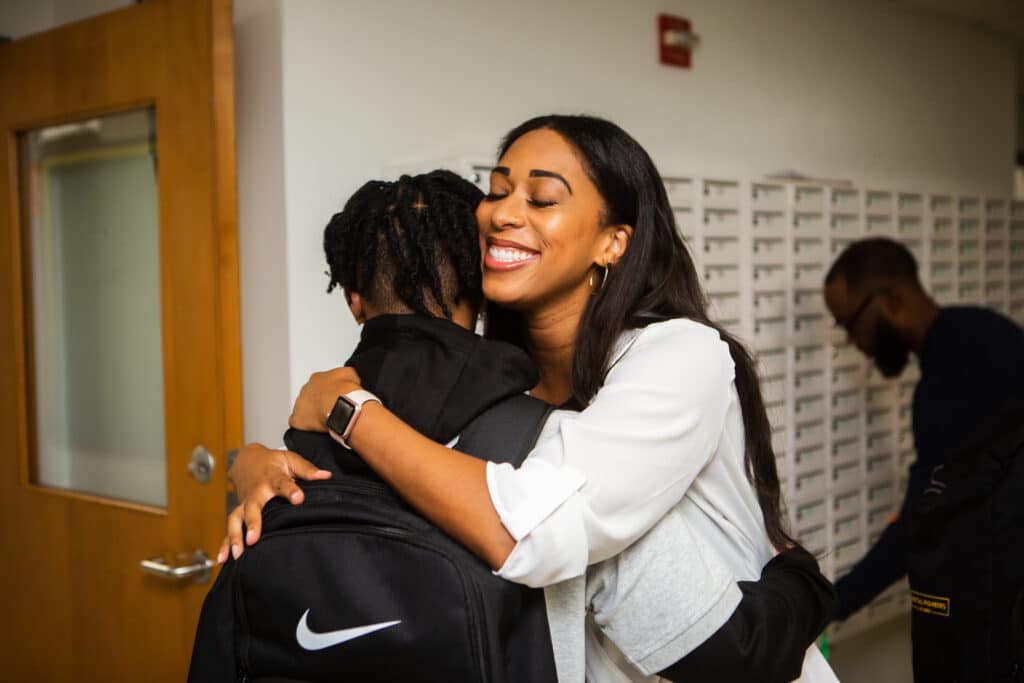Here at DPA, a public middle and high school in Southeast DC, the founding team is always challenging each other to think bolder and bigger. One question we’ve been asking is “What would it really take to meet the social and emotional needs of all of our students and staff?”
While I started as a founding teacher, today I am the High School Social Worker and Wellness Coordinator, which means I’m responsible for DPA’s overall approach to mental health.
Our founder, Mashea Ashton, has made improving mental health a priority and empowers me to lead. Her overall direction has been “You have the training. You got this. Do what you need to do.”
And so I have.

Here are 5 initiatives we have undertaken to improve mental health:
“If the adults are okay, the kids will be okay.”
The stressors of teaching are self-evident, but what’s less obvious is that so much of student behavior feeds off the energy of adults. Simply put, investing in the emotional well-being of our teachers is an indirect investment in the health of our students. That’s why we have created a work culture that celebrates self-care and normalizes the use of mental health services, including therapy.
All of our teachers have free access to therapy, and it’s not uncommon for our teachers to talk about visiting a therapist with the same level of openness as they would about going to the gym or seeing a doctor for a check-up. It’s just part of their self-care routine.
Offering psychosocial groups at school
Psychosocial groups are small group sessions where we bring together students with similar concerns in a supportive environment to develop skills in areas such as managing emotions, coping with grief, and building healthy relationships. The groups are facilitated by trained and licensed mental health clinicians and typically meet weekly for 6-8 weeks.
At DPA, we partner with an outside agency, the WISE Center, that provides counselors to lead groups. In addition, we have built a wonderful relationship with OpenSeat, a platform that provides virtual wellness coaching in individual sessions, as well as in small group sessions. We’ve also been fortunate to continue our partnership with Paving the Way for a second year in a row. Across both our middle school and high school campuses, a total of seven groups have been implemented this year as a result of targeted efforts to increase this capacity.
Expanding access to after-school activities and programs
We host Parent Cafes, which are monthly meetings dedicated to creating safe spaces for our DPA families and community partners to discuss curated topics such as emotional well-being, raising a family, and advocating for support. At a recent meeting, parents reflected on their childhoods growing up in DC, where they spent their teenage afternoons constantly busy, hanging out in rec centers or boys and girls clubs. The overwhelming consensus was that when young people are busy, they are less likely to get into trouble.
Students feel a sense of belonging at school. They crave just being around their peers in a safe space that is not an academic setting.
To give students more after-school opportunities, we decided to build out our sports offerings-including a football program.
Teaching social-emotional learning
At DPA, all students take a weekly Social-Emotional Learning (SEL) course. It’s a real class with a real grade that students take seriously. A major part of my job is preparing the weekly lessons. I design the content based on issues our mental health team observes happening around the school. For example, if students are confiding in us about a lot of relationship drama, I might teach a lesson on healthy relationships.
As DPA evolves from a start-up to a mature organization, I’m pleased to share that we will transition to a new curriculum called Character Strong next school year.
Bringing compassion to daily interactions
Many of our kids are hurting, and that’s why it’s our job as adults to always be supportive. None of the ideas above work if there isn’t trust between the child and the adult. Each interaction we as adults have with students matters deeply.
Throughout an 8-hour school day, educators have so many opportunities to build trust. The foundation of that trust is demonstrating that you care about them.
Which brings me to my last big idea. It’s a resource that is free.
More hugs. You can never give enough hugs.

